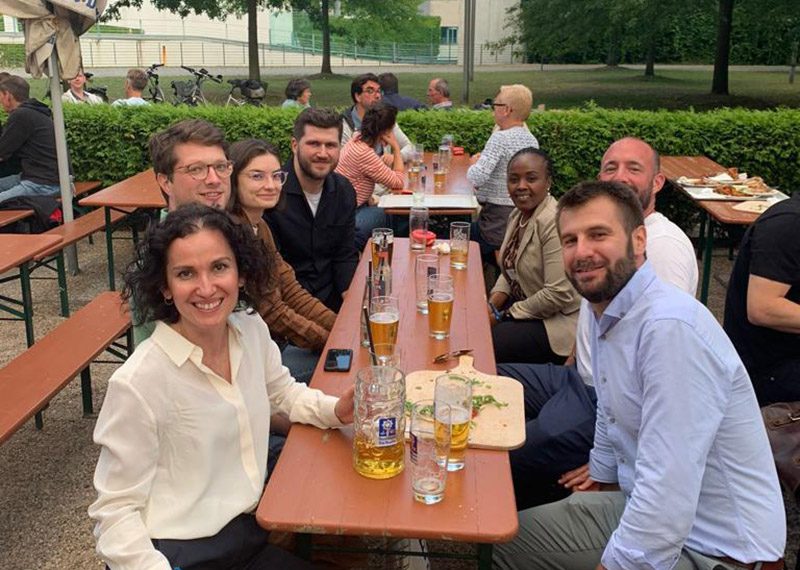In an increasingly virtual business landscape, leaders need to develop specific skills if they are to be successful managing teams and organizations remotely. Daniele Suman, project director in the automotive industry and ESMT Global Online MBA student, shares his insights into how professionals can thrive while managing global teams in the era of digital transformation.
The days of working from 9 am – 5 pm, from Monday to Friday, solely from your employer’s location are no more for those in white-collar occupations.
The past two years have seen a radical shift in how we work and in society’s attitudes to technology-enabled work. The days of working from 9 am – 5 pm, from Monday to Friday, solely from your employer’s location are no more for those in non-manual occupations. Remote workers are now the norm rather than the exception, and working from home is a viable option – and preference – for many. Teams now span countries and time zones, and companies have come to appreciate the benefits and opportunities of having flexible, virtual workspaces. Talent can be recruited regardless of location, and previously closed markets have opened up.
While remote work has many benefits, it can prove challenging for leaders unequipped with the skills required to navigate work and team management in the digital world. Teams that used to rely on in-person interactions, such as face-to-face meetings, fortuitous exchanges at the coffee machine, or informally building their professional networks over lunch or after work, have to find different ways to connect. Global teams still need to exchange information, collaborate, and solve problems, but they do it virtually and need to find ways to establish effective working relationships with people they may never meet in person.
This broadening of how we work can be particularly difficult for leaders as they must now manage, grow, and inspire teams of professionals who work across different countries and time zones. Furthermore, emails, video conferences, and virtual interactions have created new ways in which personal networks are established and developed. Given these significant changes in how professionals do business, how can leaders stay on the top of their game and manage virtual teams effectively?
Big challenges and global opportunities
For Daniele Suman, Project Director at Chassis Systems Control (Bosch), the experience of working from home during the pandemic was eye opening. As a technical professional, he developed his management skills on the job. During the pandemic, he recognized that a formal qualification would help him access new opportunities. Suman saw the ESMT Global Online MBA as a way to increase his academic knowledge and leadership skills without having to leave his job. In addition, the program format meant he could network with people all over the world, likely facing the same challenges as he was.
“During the Covid-19 pandemic, there was a lot of uncertainty and I didn’t know what my next position would be, nor in which country,” says Suman, who began his MBA journey fully online in 2021. “Doing an online MBA has helped me to successfully manage global teams with the flexibility of studying anywhere.” One way in which online programs really stand out is that students learn in a program where digitally mediated collaboration is at the heart of it. Communicating and leading virtually are part of the core curriculum at ESMT, and one of the first courses students take is how to improve communication and leadership skills when interacting with colleagues in mainly or exclusively virtual environments.
From home to the world: the new office
Like Suman, many professionals have remote work either as an option or a requirement. The advantages of working flexibly from home or while traveling are undeniable, but benefits are reduced if people are maladapted or unsupported in working virtually. As with physical offices, remote working requires the right environment, equipment, and tools to guarantee productivity and performance.
In addition to providing the right physical equipment, leaders should ensure that globally dispersed employees also have time flexibility and access to the tools and technology that facilitate communication and cooperation. “For my team, it was important to ensure that all data is available to everyone and that they could easily and autonomously find the data that they need to work with,” explains Suman.
Nurturing a global culture
Offering the right tools for work and communication can go a long way, but not without a strong team culture. If the employees meet online regularly, have clear roles and responsibilities, and understand how their work contributes to the company’s success, chances are they will be more motivated to help each other and perform better.
“I started working in my new team without seeing my colleagues face-to-face, and it was challenging to get emotionally connected to them online”, explains Suman. “We implemented daily check-ins with the team – 10 minutes is enough to connect and create the exchange we would usually have by the coffee machine”. Having the camera on during such meetings also helps to build the connection between team members, according to Suman.
The digital setting can also facilitate a new, more approachable leadership style, according to Suman. “For us, working online was an opportunity to host more events from top management and remove any attendance restrictions that the physical location imposed. We could open up events to more staff.”
An MBA to prepare the leaders of the future
In 2017, ESMT Berlin began investing heavily in educational technologies in response to a growing number of requests from businesses seeking online and blended executive education. Four years later, the first cohort of students – including Suman – started the Global Online MBA.
Learning in the Global Online MBA program takes place individually and in groups. With students located in 29 different countries, team assignments take place virtually and offer a rich and psychologically safe environment to learn and practice virtual communication and leadership skills. Combining these two elements – learning about the general principles of effective virtual communication and digital leadership, and putting those principles in practice when working in student teams – is a powerful learning experience.
“I have learned a lot and connected with people from many different backgrounds,” said Suman. “During the program, I’ve worked in different global teams. While we may be different, we are all working towards the same goal, and we motivate each other.”
Leaders of the future
Despite the focus of developing strong virtual leadership skills during the program, face-to-face networking remains a key aspect of business. Students may also choose to meet in person during one of two program Experience Weeks, either in Berlin or with a global education partner. These full-immersion experiences are an opportunity to meet and experience a different culture and environment together. “During the Berlin Experience Week, I met students with whom I had spent a lot of time (in a virtual setting), and we could have discussions that we did not have in the online environment about other topics like personal life and politics,” summarizes Suman.
Suman has benefited from the unique and innovative program structure where every moment of his learning journey has been planned and where each module weaves 2-3 different fields together to present an integrated perspective on business issues. Over the course of the program, Suman and his fellow students will learn everything that a modern decision-maker needs to be a successful leader: virtual communication and leadership skills; how to make wiser decisions under uncertainty; how to create strategic advantage; and how to enhance their understanding of their organization and their market. And this is all done in a virtual environment.
Get ready to lead in a digital world by investing in yourself. ESMT Berlin is the only top 10 European business school (European Business School ranking, Financial Times) offering a fully online MBA. Join at your convenience – January, May, or September.
This article was originally published on February 3, 2023.






































